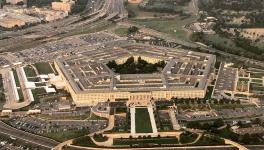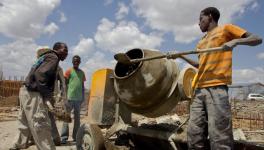Balochistan: India Opening the Pandora's Box
Prime Minister Modi’s comment on Balochistan has opened a Pandora's box. He announced from Red Fort that India will support the people of Balochistan as a diversion from Kashmir. What India does not seem to have grasped is the complexity of the struggle of the people of Balochistan. Apart from Baloch nationalism, the region has great economic importance. It has ancient trade routes, which is now sought to be incorporated as a part of the One Belt One Road project (now the Belt and Road project) that China is advancing. The China Pakistan Economic Corridor is also very much a part of this larger plan of the Belt Road project. Pakistan, Afghanistan, Iran, and China are the major stake holders in this project.
The other element that the Indian government seems to have missed completely, is that Sistan in Iran neighbours Balochistan in Pakistan and also has a Baloch nationalism problem. India is investing a very large amount of money in Chabahar port and building a relationship with Iran. Its stand on Baloch nationalism may appear Pakistan centric, but has the potential to disturb its relationship with Pakistan.
Rough Transcript
Prabir Purkayastha (Prabir): Hello and welcome to Newsclick, this program with The Real News. We have with us Commander Atul Bhardwaj and we will be discussing the issues that India has raised vis-a-vis Balochistan. The fact that Balochistan has come up in this particular way as if it is a counter to Kashmir, also seems to ignore that Balochistan has strategic issues outside India- Pakistan relations and we need to also look at that when you talk about Balochistan. Atul, it’s good to have you with us.
Atul Bhardwaj (Atul): Thank you.
Prabir: Prime Minister Modi's response to Balochistan seems to have been almost a response to Kashmir. While Kashmiris are saying we have nothing to do with Balochistan our issues are our issues. Why is India or the Prime Minister bringing in the Balochistan issue? But Balochistan has a strategic significance outside the India and Pakistan relation itself. So do you think we have been very shall we say diplomatic in raising Balochistan in this way?
Atul: The same BJP which is now talking Balochistan in very loud voices had actually condemned Prime Minister Manmohan Singh when he had mentioned at Sharm El Sheikh the word Balochistan. Prime Minister Modi now has in fact announced from the ramparts of the Red Fort that he is going to provide 'moral support' to the Balochi rebels, which is a very significant statement. It marks a strategic shift also in India's policy because if you actually see, here we are saying that we are now going to be involved in something, which the West has identified as responsibility to intervene.
Prabir: Our to be responsibility to protect kind of philosophy.
Atul: Yes, basically it is an interventionist policy. The same policy and it is all done in the name of human rights. The same policy, that Pakistan has been adopting vis-a-vis Kashmir.
Prabir: One prism of it justifies therefore, in some sense Pakistan's intervention in Kashmir. This is what a lot of people have said and this also was earlier being talked about by BJP when the Manmohan Singh issue was raised. It has not been helped by the fact that it happened really at the time of the Quetta blast which killed about 90 leading lawyers in Quetta and therefore, it was also claimed by forces inimical to India to be an Indian intervention. So de-legitimizing the Baloch struggle in some way this is one part of it. So is this tit for tat business between India and Pakistan on Kashmir and then trying to use Balochistan against Kashmir. What you are saying is this itself is self defeating in some sense.
Atul: It is absolutely self defeating because what you are here intending to do is that we will pay Pakistan in the same coin as they have been doing to us. You are basically saying that we will emasculate the Pakistan army in this particular manner. What you are not calculating in your strategy is that Pakistan can abandon for some time its interest in Balochistan but the Pakistani army may not abandon or concede ground in Kashmir.
Prabir: I would like to raise the other dimensions. Balochistan has three other countries apart from Pakistan who would find this of concern. What is of course publicly known, China because the economic corridor runs through Balochistan and therefore, the China Pakistan economic corridor which ends at the Gwadar port is going to be affected if there is insurgency over there. What is not realized is that India is also setting up Chabahar the port and it's again in Iran, it's in Sistan province. Russia and Iran both have a stake in the Sistan province as does India because of the port that it is building. Now, if you support Baloch nationalism which is what you are trying to do in this particular case, it also could have an effect on Sistan which also has a Baloch minority issue and also a demand for autonomy again very similar to what the Baloch problem in Pakistan is.
Atul: Basically if we see, Balochistan has become central to 21st Century Geo-politics. What is happening exactly is that Balochistan which is the Southwestern province of Pakistan, is deeply into poverty and basically if you see that it is the least developed area in Pakistan. There is an insurgency problem which is basically at a very low level at the moment. But there are lots of players which see how this insurgency can be exploited. When I talk in terms of Geo-politics its location of Balochistan geographically and politically is very important for Western power projection. Number two, Balochistan also gives you access to the Indian Ocean. Number three, as you rightly mentioned China has entered into the game now with its forty six billion dollar investments in Pakistan. Now that has actually raised the importance of the entire region exponentially. Now, the whole game of using Balochistan is primarily to contain China, not to let China have access to trade routes that it wants to build. When we talk in terms of India, is India actually playing its own game? We are using the Kashmir rhetoric basically to justify our getting involved on behalf of the West in Balochistan. In Balochistan, you have Americans, you have Israelis, you have Europeans all involved now and the timings of our interventions or our stated interventions in Balochistan are actually matching with what is happening on the ground by these players. If you see, Balochistan sits astride three countries, Afghanistan, Iran and Pakistan
Prabir: It has a two sets of issues. One is Baloch nationalism and also Islamic fundamentalist forces closely aligned to ISIS kind of forces who have been backed earlier by the United States to destabilize Iran. In fact, a senior General was killed allegedly by these forces who have been officially backed by the United States. So you are really going into very troubled waters of Iran as well by fomenting the Baloch issue.
Atul: We do not understand it actually. I don't know whether the Indian establishment has actually debated the consequences of it. We are playing a similar game. We have history right in front of us. Pakistan was involved in a similar game in this particular region with Afghanistan, Balochistan to contain Soviet Union.
Prabir: We are now trying to do what Pakistan was trying to do. But you know, there is one difference. Pakistan had a natural border with Afghanistan. We have none with Balochistan. The only border that exists in Balochistan which is conceivably favorable to us is the Iran border and that is certainly not going to be very happy with bringing up this issue.
Atul: I fully agree with you on that particular aspect that we do not have any coterminous borders with this particular region not with the region but Balochistan as such. Yet, we want to play that larger game and we want to get embroiled more and more into that game without understanding what could be the consequences.
Prabir: I will end with this question. Do you think it is a time for the Indian strategic establishment to take a hard look at Balochistan independent of Kashmir and Pakistan?
Atul: There is definitely a need. Kashmir and Pakistan's rhetoric should not be used to get into a larger game which is being played in Balochistan. Is it in our interest to play that game is a question. Why would we not be interested in those trade routes getting opened is the question. Of course, the consequences which could accrue by playing this particular game we have the example of Pakistan, the kind of consequences it is having to bear because of playing this dirty war. It's a hybrid war that you will be playing because it is not that if at all you play the game in Balochistan you will not be playing with your military. You will be playing with actors which are less than military.
Prabir: In any case without the natural borders that game becomes limited. But the other part of it is when you talk about trade routes. The other trade route is Russia Iran Chabahar in which India has a stake because it is supposedly building the Chabahar port. So in that sense, it is also something which is against our own economic interest if this region gets destabilized.
Atul: It is against our economic interest because for a long time the region has actually been botched up and not been trading with each other.
Prabir: Thank you very much Atul. We will be watching these issues very closely. This is all the time we have today, keep watching Newsclick.
DISCLAIMER: Please note that transcripts for Newsclick are typed from a recording of the program. Newsclick cannot guarantee their complete accuracy.
Get the latest reports & analysis with people's perspective on Protests, movements & deep analytical videos, discussions of the current affairs in your Telegram app. Subscribe to NewsClick's Telegram channel & get Real-Time updates on stories, as they get published on our website.
























